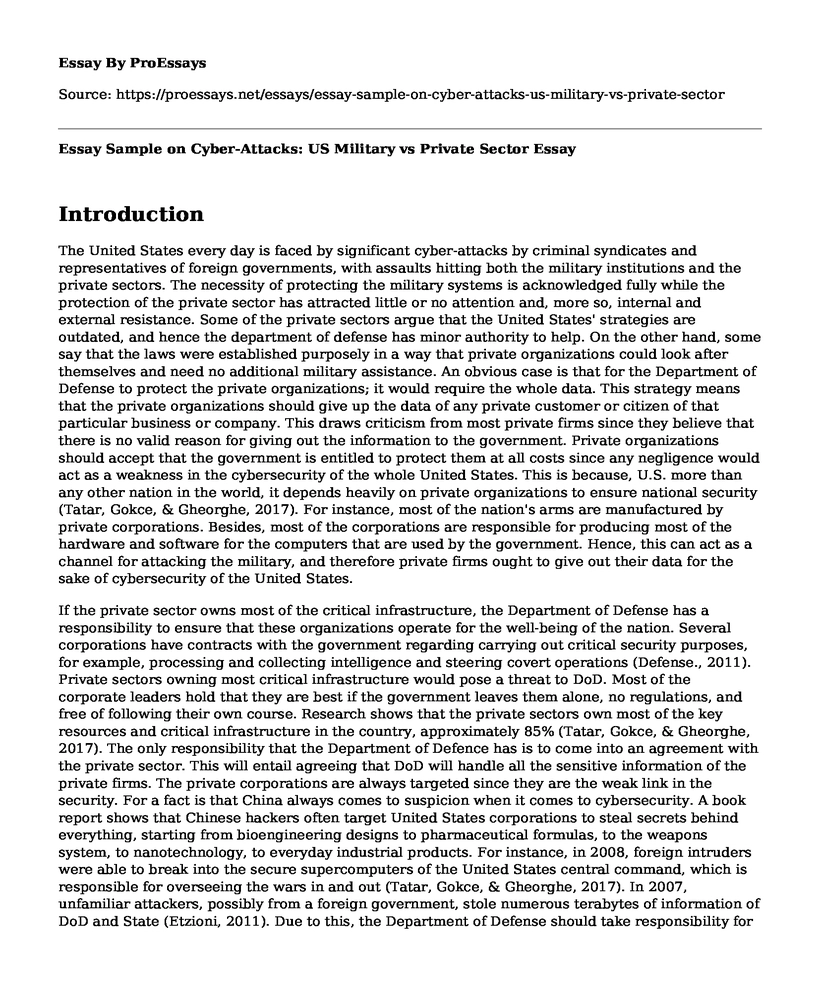Introduction
The United States every day is faced by significant cyber-attacks by criminal syndicates and representatives of foreign governments, with assaults hitting both the military institutions and the private sectors. The necessity of protecting the military systems is acknowledged fully while the protection of the private sector has attracted little or no attention and, more so, internal and external resistance. Some of the private sectors argue that the United States' strategies are outdated, and hence the department of defense has minor authority to help. On the other hand, some say that the laws were established purposely in a way that private organizations could look after themselves and need no additional military assistance. An obvious case is that for the Department of Defense to protect the private organizations; it would require the whole data. This strategy means that the private organizations should give up the data of any private customer or citizen of that particular business or company. This draws criticism from most private firms since they believe that there is no valid reason for giving out the information to the government. Private organizations should accept that the government is entitled to protect them at all costs since any negligence would act as a weakness in the cybersecurity of the whole United States. This is because, U.S. more than any other nation in the world, it depends heavily on private organizations to ensure national security (Tatar, Gokce, & Gheorghe, 2017). For instance, most of the nation's arms are manufactured by private corporations. Besides, most of the corporations are responsible for producing most of the hardware and software for the computers that are used by the government. Hence, this can act as a channel for attacking the military, and therefore private firms ought to give out their data for the sake of cybersecurity of the United States.
If the private sector owns most of the critical infrastructure, the Department of Defense has a responsibility to ensure that these organizations operate for the well-being of the nation. Several corporations have contracts with the government regarding carrying out critical security purposes, for example, processing and collecting intelligence and steering covert operations (Defense., 2011). Private sectors owning most critical infrastructure would pose a threat to DoD. Most of the corporate leaders hold that they are best if the government leaves them alone, no regulations, and free of following their own course. Research shows that the private sectors own most of the key resources and critical infrastructure in the country, approximately 85% (Tatar, Gokce, & Gheorghe, 2017). The only responsibility that the Department of Defence has is to come into an agreement with the private sector. This will entail agreeing that DoD will handle all the sensitive information of the private firms. The private corporations are always targeted since they are the weak link in the security. For a fact is that China always comes to suspicion when it comes to cybersecurity. A book report shows that Chinese hackers often target United States corporations to steal secrets behind everything, starting from bioengineering designs to pharmaceutical formulas, to the weapons system, to nanotechnology, to everyday industrial products. For instance, in 2008, foreign intruders were able to break into the secure supercomputers of the United States central command, which is responsible for overseeing the wars in and out (Tatar, Gokce, & Gheorghe, 2017). In 2007, unfamiliar attackers, possibly from a foreign government, stole numerous terabytes of information of DoD and State (Etzioni, 2011). Due to this, the Department of Defense should take responsibility for the information concerning the critical infrastructure owned by the private sector.
References
Defense., U. S. (2011). Department of Defense strategy for operating in cyberspace. Washington, D.C: Dept. of Defense.
Etzioni, A. (2011, May 28). Cybersecurity in the Private Sector. Retrieved from Issues. Org: https://issues.org/etzioni-2/
Tatar, U., Gokce, Y., & Gheorghe, A. V. (2017). Strategic cyber defense: a multidisciplinary perspective. Amsterdam: IOS Press.
Cite this page
Essay Sample on Cyber-Attacks: US Military vs Private Sector. (2023, Apr 24). Retrieved from https://proessays.net/essays/essay-sample-on-cyber-attacks-us-military-vs-private-sector
If you are the original author of this essay and no longer wish to have it published on the ProEssays website, please click below to request its removal:
- Why We Need the Police in the Society
- Paper Example on Truth in Sentencing (TIS)
- Making Arguments on Gun Control Across Media
- The Death Penalty International Public Policy - Research Paper
- Inmate Early Release - Essay Sample
- Essay on Title III vs Article 13: Regulating Interception of Communications
- Paper Example on Civil Rights Movement: Journey to Racial Equality in the US







